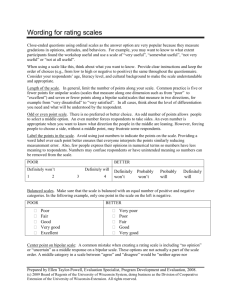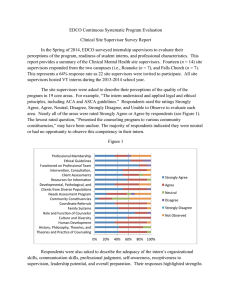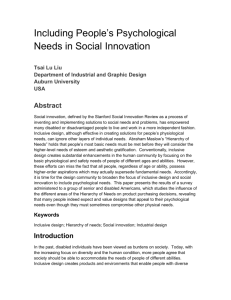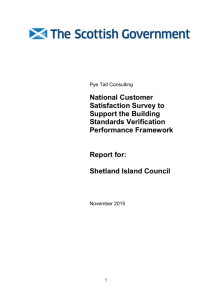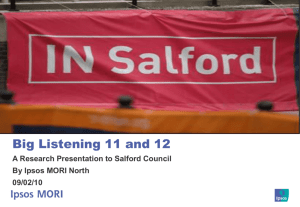Exercise: Common planning problems work material
advertisement
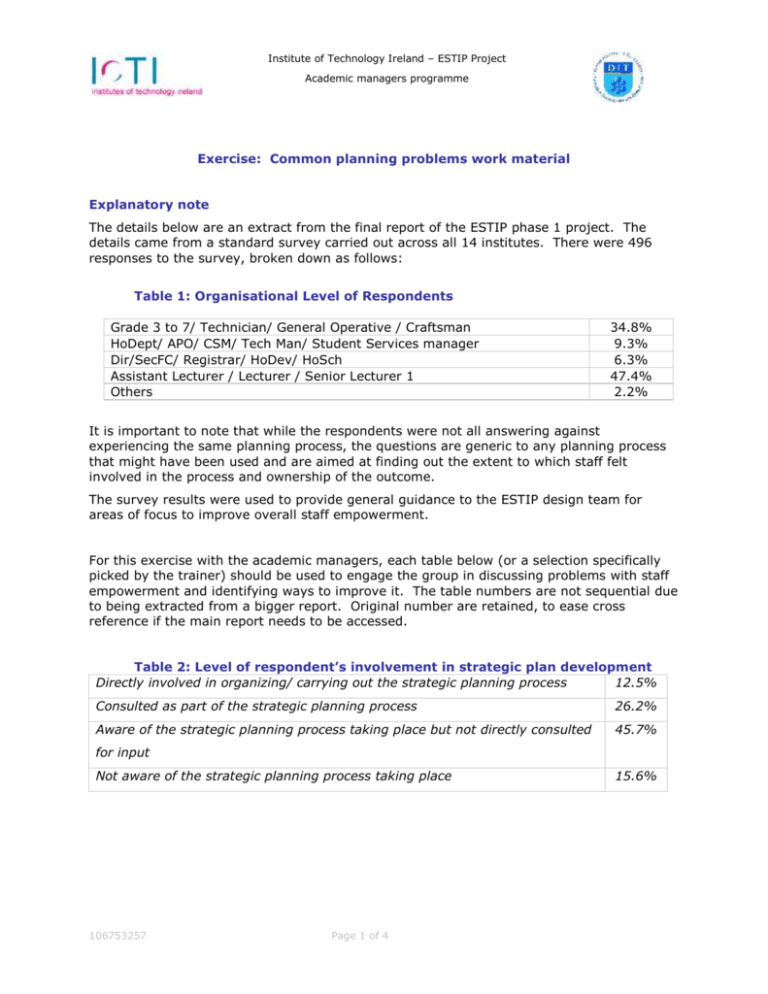
Institute of Technology Ireland – ESTIP Project Academic managers programme Exercise: Common planning problems work material Explanatory note The details below are an extract from the final report of the ESTIP phase 1 project. The details came from a standard survey carried out across all 14 institutes. There were 496 responses to the survey, broken down as follows: Table 1: Organisational Level of Respondents Grade 3 to 7/ Technician/ General Operative / Craftsman HoDept/ APO/ CSM/ Tech Man/ Student Services manager Dir/SecFC/ Registrar/ HoDev/ HoSch Assistant Lecturer / Lecturer / Senior Lecturer 1 Others 34.8% 9.3% 6.3% 47.4% 2.2% It is important to note that while the respondents were not all answering against experiencing the same planning process, the questions are generic to any planning process that might have been used and are aimed at finding out the extent to which staff felt involved in the process and ownership of the outcome. The survey results were used to provide general guidance to the ESTIP design team for areas of focus to improve overall staff empowerment. For this exercise with the academic managers, each table below (or a selection specifically picked by the trainer) should be used to engage the group in discussing problems with staff empowerment and identifying ways to improve it. The table numbers are not sequential due to being extracted from a bigger report. Original number are retained, to ease cross reference if the main report needs to be accessed. Table 2: Level of respondent’s involvement in strategic plan development Directly involved in organizing/ carrying out the strategic planning process 12.5% Consulted as part of the strategic planning process 26.2% Aware of the strategic planning process taking place but not directly consulted 45.7% for input Not aware of the strategic planning process taking place 106753257 Page 1 of 4 15.6% Institute of Technology Ireland – ESTIP Project Academic managers programme Table 4: Respondents views on level of follow up in the development of the strategic plan There is real and meaningful follow up – together, we continued to build 15.1% operational plans directly related to achieving the objectives in the strategic plans Some follow up but it is not enough – made aware of design and refinement of 49.7% operational plans but not involved in formulating them No follow up – didn’t hear anything about the strategic plan or its 35.3% implementation and progress after it was published Table 5: Level of satisfaction of respondents with their level of involvement in strategic plan development Very satisfied 8% Satisfied 19.4% Neither satisfied or dissatisfied 35.6% Dissatisfied 23.9% Very dissatisfied 13.1% Table 7: Agreement of respondents that they feel a strong sense of ownership of the strategic plan due to the empowerment felt from the process used to develop it Strongly agree 5.1% Agree 12.6% Neither agree nor disagree 26.5% Disagree 31.3% Strongly disagree 24.5% Table 9: Level of agreement of respondents with the view that there should be greater staff involvement in the strategic planning process Strongly agree 37.1% Agree 40.2% Neither agree nor disagree 17.3% Disagree 4.1% Strongly disagree 1.2% 106753257 Page 2 of 4 Institute of Technology Ireland – ESTIP Project Academic managers programme Table 10: Level of involvement of respondents in operational planning at School/ Department/ Functional area Directly involved in organising the operational planning process 21.5% Consulted as part of the operational planning process 29.8% Aware of the operational planning process taking place but not directly 28.9% consulted for input Not aware of the operational planning process taking place 19.8% Table 11: Level of satisfaction of respondents with their level of involvement in operational plan development at School/Department/ Functional area Very satisfied 11.6% Satisfied 25.3% Neither satisfied or dissatisfied 28.8% Dissatisfied 19.1% Very Dissatisfied 15.1% Table 13: Respondents views on the level of follow that exists in operational plan development in their School/ Department/ Functional area There is real and meaningful follow up – we have regular reviews of progress 17.6% of achieving our plans with all section members contributing to our reviews Some follow up but it is not enough – we are told how much progress is being 47.1% made with delivering planned activity but have no involvement in assessing our own progress. No follow up – After operational plans were made, we didn’t hear anything else 35.4% about how the plan delivery progressed. Table 14: Level of agreement with the statement that there needs to be a greater level of staff involvement in the operational plan development in their School/ Department/ Functional area Strongly agree 34.5% Agree 39.5% Neither agree nor disagree 19.8% Disagree 4.4% Strongly disagree 1.9% 106753257 Page 3 of 4 Institute of Technology Ireland – ESTIP Project Academic managers programme Lessons learned from survey qualitative responses 1. Put time, resources, support and facilitation into the process. 2. Learn from international best practice 3. Develop better information sharing and communication around strategic planning. 4. Develop a cyclical model of strategic planning which includes emphasis on prioritisation, follow up, implementation and measurement of outcomes. 5. Ensure that there is appropriate management and staff development to enable both staff and management to develop the skills needed to engage in a strategic planning process. 6. Poor staff morale, scepticism and cynicism about this process came through in all of the institutes’ responses. In each institute, staff believe that the next strategic planning process they are involved in must provide for genuine involvement and really focus on follow through/ delivery or staff will feel even more disempowered and apathetic. Summary conclusions A number of critical success factors emerged from the project which are covered in detail in the ESTIP reference manual. It is recommended that these should be considered by the Institutes as they move into their next phase of plan development. The need for better pre-planning of the overall strategic and operational planning processes. The need for a more integrated approach to planning, linking strategic and operational plans with the PMDS process The effective use of performance measurement, review and management. The need for a more systematic approach to evaluating current strengths and weaknesses as part of plan preparation. Effective and comprehensive communications with staff and stakeholders on all aspects of the planning process. 106753257 Page 4 of 4


